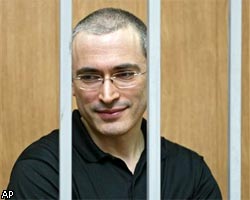 Exactly
one year ago, on October 25, 2003, Mikhail Khodorkovsky, Chief Executive
Officer and a key shareholder in the oil company YUKOS, was arrested. Exactly
one year ago, on October 25, 2003, Mikhail Khodorkovsky, Chief Executive
Officer and a key shareholder in the oil company YUKOS, was arrested.
A lot has happened since that time. Shortly after he was arrested, Mr.
Khodorkovsky resigned as the company’s CEO. Criminal proceedings
were initiated against another two key shareholders of the company. Sibneft
scrapped its planned merger with YUKOS, and the embattled oil company faced
huge tax claims. Most analysts are convinced that YUKOS will cease to exist
in its present form before the end of 2004, and they do not expect Mr.
Khodorkovsly to be released over the next 1-2 years.
The YUKOS case is unfolding gradually, and it becomes increasingly complicated.
First came the arrest of Khodorkovsky’s close associate Platon Lebedev,
the head of the MENATEP company and one of YUKOS’s largest shareholders.
He was accused of stealing a 20 percent stake in the state-owned fertilizer
company Apatit back in 1994. At that time, YUKOS security official Alexey
Pichugin was arrested. This was followed by raids of YUKOS’ business
center in Korallovo, in the Moscow region.
After those events, Mikhail Khodorkovsky held a news conference. He
told reporters he was not going to leave the country and become a political
emigrant. “If they want to push me out of the country or jail me,
let them jail me,” Mr. Khodorkovsky said.
His words were taken literally. Three weeks after the press conference,
Russia’s richest man found himself in prison. At the beginning of
the YUKOS affair, this seemed impossible. But further events made it clear
that the authorities were trying many new methods, and they seemed to
work.
A huge tax claim of $3.4bn for 2000 was brought against the company
only at the end of 2003, after the statute of limitations expired. The
oil company faced an unprecedented tax claim of over $7bn for 2000-2001.
There is little doubt that the tax authorities would make similar demands
for 2002-2003.
It seems the government and law enforcement agencies are competing with
each other in making claims against YUKOS. Freezing the assets of the
oil company and its subsidiaries, threats by the Natural Resources Ministry
to revoke oilfield licenses from YUKOS’s subsidiaries, issuing international
arrest warrants for nearly all of YUKOS’s key shareholders…
This list can be continued.
YUKOS, which positioned itself as Russia’s “most transparent”
company, is far from ideal. The company indeed used tax optimization schemes.
YUKOS’s affiliates took part in privatization tenders and, given
the imperfection of Russia’s laws at that time, they could have
used the situation. The company’s so-called “transparency
and openness” is dubious – so, minority shareholders are not
represented on the Board of Directors.
But such claims can be made against most of Russia’s largest businesses.
What happened to YUKOS, analysts say, is due to several factors, including
Mr. Khodorkovsky’s political activity.
He was the first Russian businessman to openly support two liberal political
parties – the Union of Right Forces and Yabloko. In fact, YUKOS
shareholders sponsored various political parties, from the Communist Party
to the pro-Kremlin United Russia. The former YUKOS CEO is also accused
of lobbying the State Duma to push through laws favorable to the company.
Though, such activities are not outlawed in Russia, and Mr. Khodorkovsky
was arrested on other charges, not related to his political activity.
The main aim achieved by the authorities in the YUKOS case is the predictability
of Russia’s large businesses. Not a single oligarch came out openly
against the government’s policy on YUKOS. It is almost impossible
to imagine that a large businessman might criticize the government’s
campaign or refuse to consult with government official on an important
deal.
It is difficult to say how events around YUKOS and Mikhail Khodorkovsky
will develop. The company might save its face – Russian President
Vladimir Putin repeatedly said that the government was not interested
in the bankruptcy of YUKOS. But YUKOS will not manage to save its oil
assets, with its main production subsidiary Yuganskneftegaz likely to
be auctioned at the end of November.
Gazprom, a state-owned gas giant, is seen as the most likely buyer of
Yuganskneftegaz, though the company’s CEO Alexey Miller said Gazprom
was not interested in buying YUKOS’s assets.
In the opinion of Mr. Khodorkovsky’s and Mr. Lebedev’s lawyers,
the trial against the two business partners could early next year. If
the government wanted to neutralize Mikhail Khodorkovsky as a political
figure, it produced the opposite result. A year ago, Mr. Khodorkovsky’s
name was known mostly to politicians, businessmen, reporters and the residents
of oil-rich regions. Today, he is a household name in Russia.
See also:
YUKOS Case
|